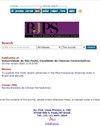Experimental acute anti-inflammatory activity of preparations with complexed cannabidiol in carriers
IF 0.9
4区 医学
Q4 PHARMACOLOGY & PHARMACY
Brazilian Journal of Pharmaceutical Sciences
Pub Date : 2023-08-28
DOI:10.1590/s2175-97902023e221000
引用次数: 0
Abstract
Cannabidiol (CBD) is a bioactive compound with promising anti-inflammatory results but has low aqueous solubility. Complexation of drugs with this characteristic in carriers is an alternative to improve their efficiency. This study aimed to prepare and characterize CBD complexes in different carriers, and to evaluate the anti-inflammatory effect of such preparations using an experimental model of edema induction in rat paws. The results were compared to a reference drug, ibuprofen (IBU). The carriers evaluated were beta cyclodextrin (bCD) and activated charcoal (AC). Quantification of the drugs in the complexes was determined, and different qualitative analyses were also performed. Oral treatments in single doses with CBD showed inhibitory effects similar to that of IBU, potentiating its bioactivity without significant adverse effects. CBD*bCD doses at 4.375, 8.75, 17.5, and 35 mg/kg significantly reduced the intensity of edema compared to equivalent doses of pure bioactive. In contrast, CBD*AC did not generate benefits. There was no significant inhibitory effect on myeloperoxidase activity, requiring more specific analyses to assess this parameter. The results suggest that the CBD*bCD complexation is perfectly feasible, increasing its anti-edematogenic efficacy in the experimental model used.复合大麻二酚载体制剂的实验性急性抗炎活性
本文章由计算机程序翻译,如有差异,请以英文原文为准。
求助全文
约1分钟内获得全文
求助全文
来源期刊

Brazilian Journal of Pharmaceutical Sciences
PHARMACOLOGY & PHARMACY-
CiteScore
1.40
自引率
0.00%
发文量
165
审稿时长
7.5 months
期刊介绍:
The Brazilian Journal of Pharmaceutical Sciences accepts for publication Original Papers applicable to the fields of Pharmaceutical Sciences; Reviews and Current Comment Articles, which are published under the Scientific Editor and Associate Editors invitation to recognized experts or when they are spontaneously submitted by the authors in the form of abstracts to have their importance evaluated. A critical view of the subject with insertions of results of previous works in the field in relation to the state of art must be included; Short Communications reporting new methods and previews of works on researches of outstanding importance in which originality justify a quick publication. A maximum of 2000 words excluding tables, figures and references is an acceptable limit. One table, one figure and ten references may be added, and Book Reviews of the latest editions of books, prepared by specialists invited by the Scientific Editor and Associate Editors. Thematic Supplements as well as those related to scientific meetings can be published under the Scientific Editor and/or Associate Editors agreement.
 求助内容:
求助内容: 应助结果提醒方式:
应助结果提醒方式:


